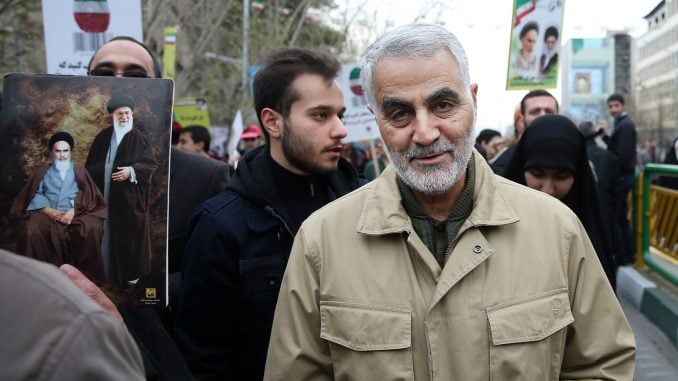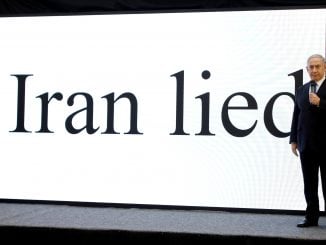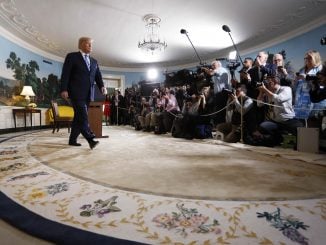
On Jan. 5, after American drones took out Iranian terrorist mastermind Gen. Qassem Soleimani, CNN’s Brian Stelter launched into one of his Sunday-morning sermons, insisting that patriotism flows like a river in America’s newsrooms. His definition might vary from yours, however.
Patriotism equals tough questioning, the “Reliable Sources” anchor stated in a tweet: “It is patriotic to ask for evidence. To question official accounts. … It is patriotic to hold our leaders accountable.”
There’s nothing wrong with skeptical questions of our government. But why is it impossible to celebrate blowing up the man responsible for the deaths of untold thousands, including over 600 Americans? And why do the media so often fail to muster that same sort of skeptical questioning for the tyrants and thugs opposing American interests? Theirs is a long, sordid history of offering unchallenged platforms, and even buttery sympathy, to our enemies.
Just five months ago, “NBC Nightly News” put a heading on screen that read, “Lester Holt’s Exclusive Access Inside Iran,” but Holt’s questions were exceedingly polite and bland. He mentioned to Iranian Foreign Minister Mohammad Zarif the U.S. administration’s calling Iran a “state sponsor of terror” and then just asked, “To all that, you say what?” In another interview, Iran’s top national security official explicitly insisted Iran would crush America in a war, but Holt could only ask, “How far is Iran willing to go to defend its interests?”
In the same news cycle, CBS foreign correspondent Imtiaz Tyab lined up Maj. Gen. Hossein Dehghan, the military adviser to Iran’s supreme leader, to denounce President Donald Trump. “Hossein Dehghan says the U.S. is behaving like pirates and called President Trump a gangster,” Tyab said. No dissenting voices.
Worse yet, Tyab then went to a hospital to underline enemy propaganda about U.S. sanctions causing children to die of cancer in Iran. No skepticism was demonstrated.
But it can be even worse. Take Stelter’s CNN. In 2012, then-prime-time host Piers Morgan asked then-Iranian President Mahmoud Ahmadinejad, “How many times in your life, Mr. President, have you been properly in love?” Through a translator, the Iranian leader responded: “I’m in love with all of humanity. I love all human beings.” Morgan gushed, “That might be the best answer I’ve ever heard to that question.”
In February 2007, ABC anchor Diane Sawyer also paid homage to Ahmadinejad’s feelings, saying: “Is there anything surprising, personal about President Ahmadinejad that we didn’t know?’ Well, it turns out, someone told me he cries a lot. That he is dramatically sentimental and sympathetic if someone comes up and expresses a personal plight. So I just asked him. ‘Are you often in tears?'” Ahmadinejad replied, “Yes, that’s true.”
Touching.
It’s also hard to forget how Sawyer got access to murderous Syrian dictator Bashar Assad on the same treacle tour. She asked: “You like video games? … Do you have an iPod? … And you’re a country music fan. Faith Hill? Shania Twain?” She touted Assad’s “elegant, athletic” wife and added that they “famously live in a modest home.”
This has been going on for decades. In 2003, Dan Rather was thrilled to get a sit-down interview with Saddam Hussein. He respectfully addressed him as “Mr. President” and sat cooperatively as that thug declared that he had won 100% of the last election. “One hundred percent,” Rather repeated, with a tone that sounded like “You don’t say?” He begged Hussein to say some words in English and asked him whether that might be the last time they would meet.
If our press were truly patriotic, they would question our tyrannical enemies at least as skeptically as they question our own elected leaders. Instead, they’re so hungry for access, for a big “get,” that they sound like butlers and maids of the world’s worst thugs.
Oh, and they hate Trump.
Brent Bozell III is the president of the Media Research Center. Tim Graham is director of media analysis at the Media Research Center and executive editor of the blog NewsBusters.org.


